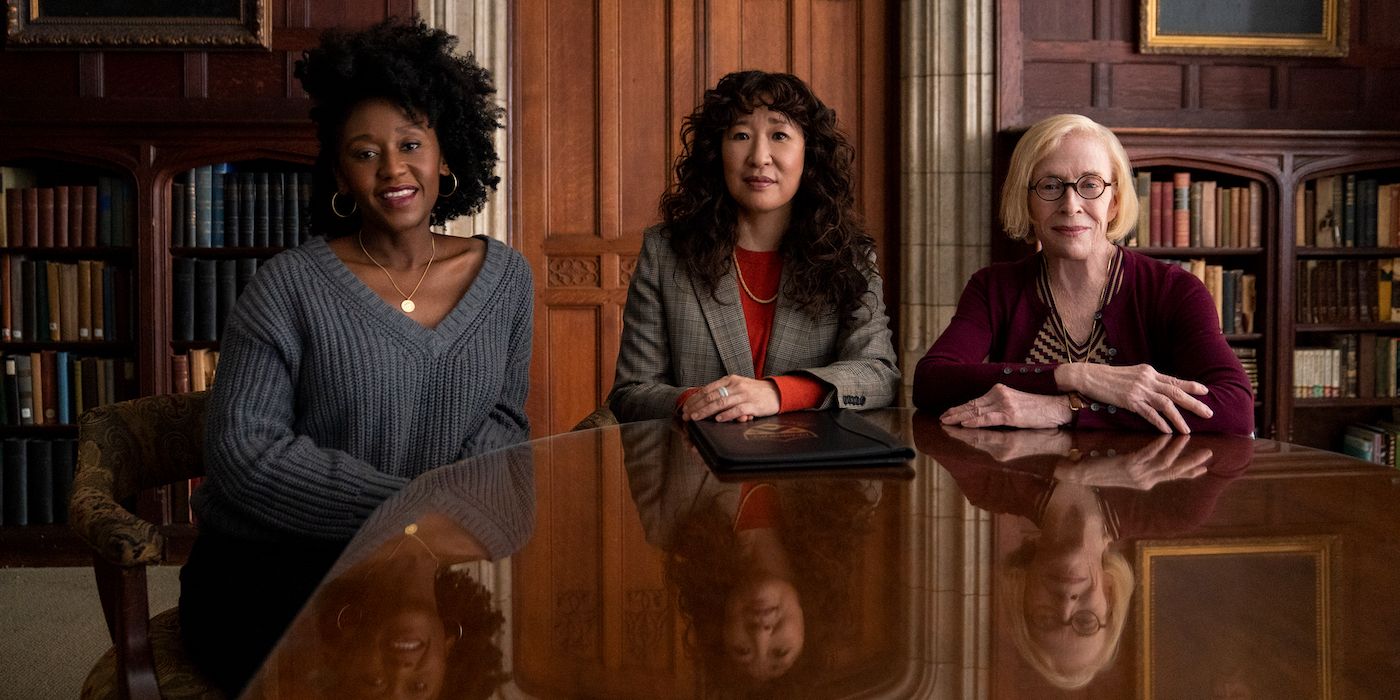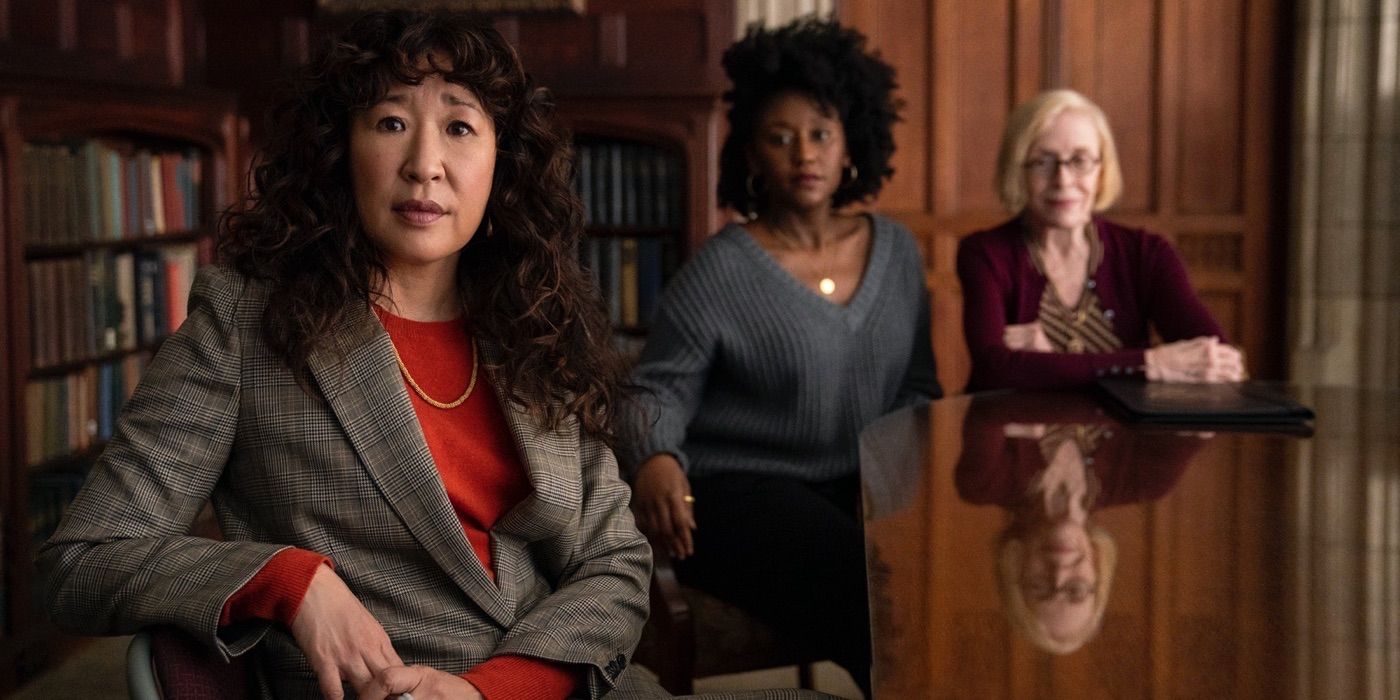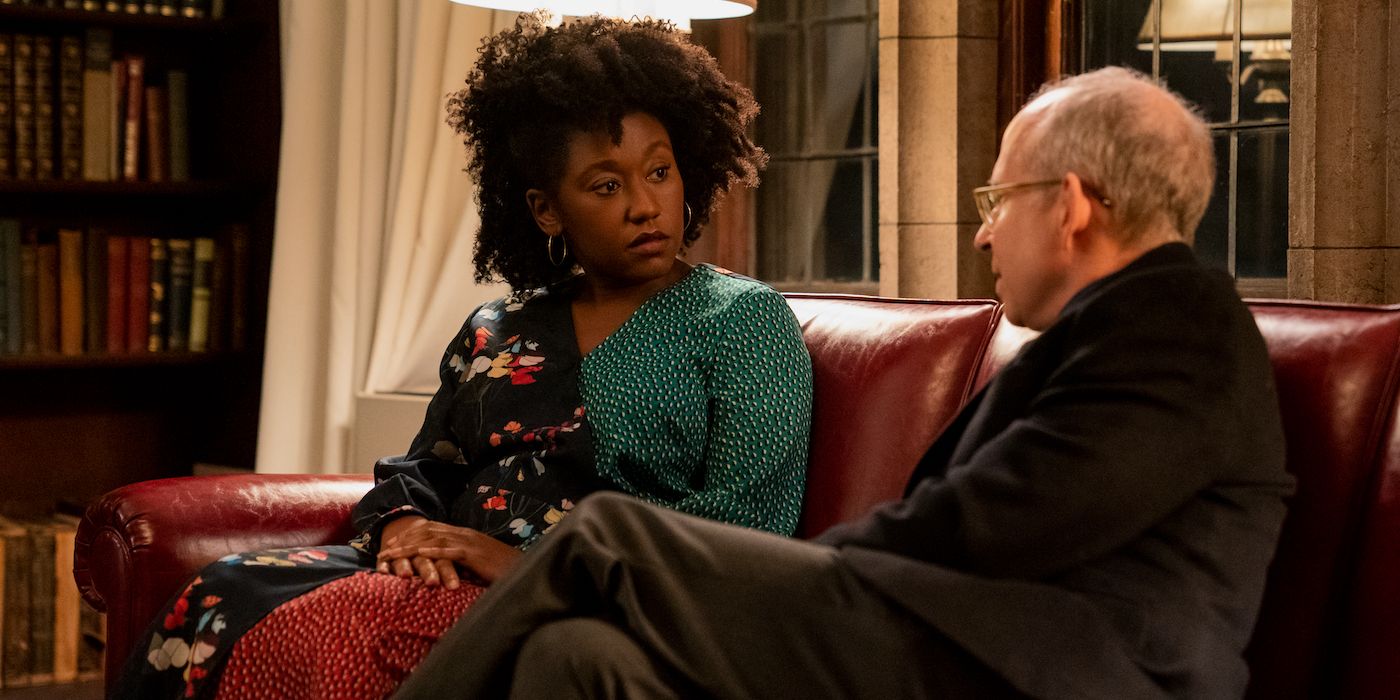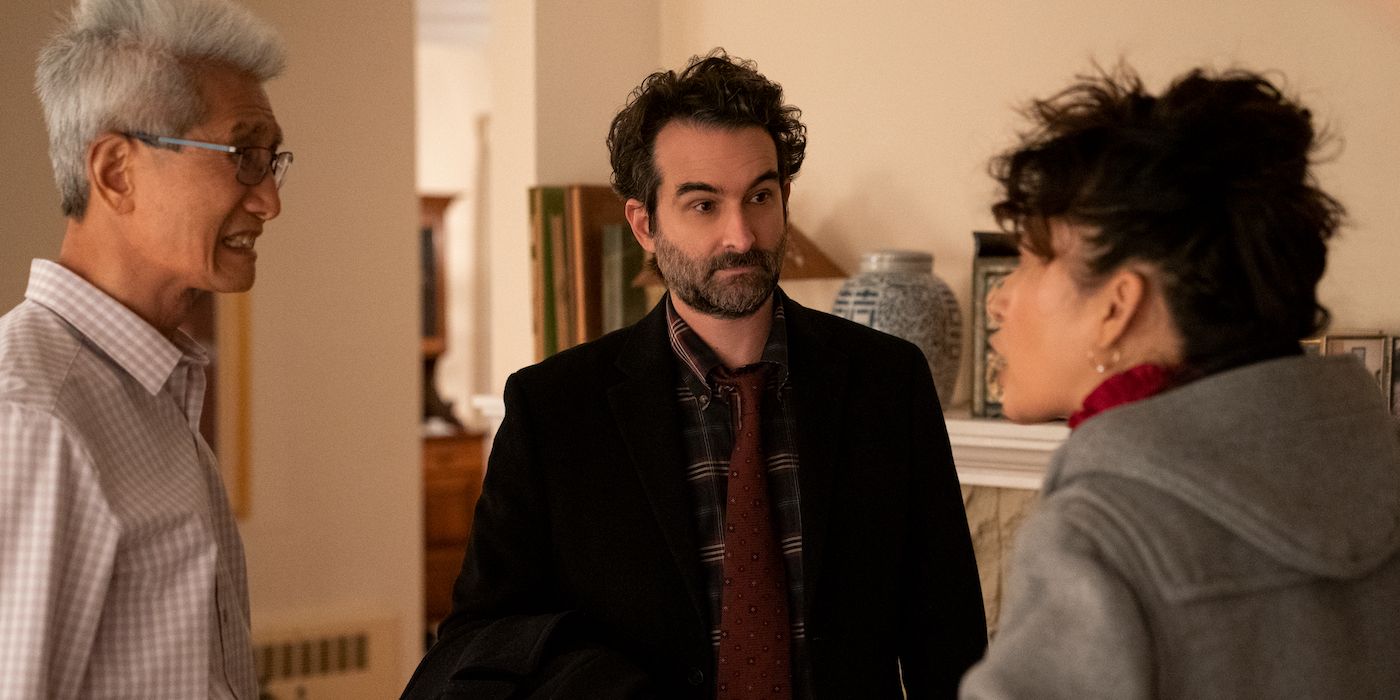Editor's note: The following contains spoilers through the Season 1 finale of The Chair, "The Chair."
In Netflix's The Chair, protagonist Dr. Ji-Yoon Kim (Sandra Oh), pleads with her colleague, the brilliant and progressive Professor Yasmin "Yaz" McKay (Nana Mensah), "You are going to be the first tenured Black woman in the department." Yaz replies with an exhausted sigh, "That's why I'm leaving."
If there is one moment in the entirety of the Netflix mini-series The Chair that you should take with you, it's this one.
The long history of white privilege in higher education is well-documented. Even so, it isn't a secret that the elite system has a long way to go in dismantling its history of institutional racism that negatively affects students of color and favors the white elite. The Chair may be witty, oftentimes satirical, but it is also a truthful examination of white privilege.
Created by Amanda Peet and Annie Julia Wyman (a former Harvard and Cambridge academic), the six-episode series stars the brilliant Sandra Oh as Professor Ji-Yoon Kim, the first woman of color to have been made the Chair of the English Department at Pembroke College, a fictional “lower-tier Ivy'' institution. As Ji-Yoon navigates her new role as Chair, she struggles to reconcile her feelings of personal obligation and loyalty to her older colleagues, most notably Professor Elliot Rentz (Bob Balaban) and Professor Joan Hambling (Holland Taylor), while also fighting to break boundaries in the department. This tension is particularly detrimental to her colleague Yaz, Pembroke's groundbreaking new scholar and young woman of color who is up for tenure. As Ji-Yoon attempts to mollify her older colleagues while also securing Yaz's tenureship, she is continuously distracted by her romantic feelings for her long-time close friend and colleague, popular Professor Bill Dobson (Jay Duplass), who is grieving the recent death of his wife.
Powerfully, not only does The Chair refuse to shy away from confronting the rampant white privilege (especially white male privilege) in the academy, but it also explores privilege in a way that captures the tension between personal loyalty and systemic inequality in the academy.
Ji-Yoon, for example, views Yaz as the savior of Pembroke's English department, which has long been plagued by low enrollment. Yaz, who teaches the popular and progressive American lit course she calls "Sex and the Novel," celebrates student expression by connecting with them in a way that draws upon their passions such as art and music while also mobilizing the skills of close reading. After Ji-Yoon has to beg Yaz to let Elliot co-teach her class due to his low enrollment (to his lack of knowledge), Elliot — who is unfortunately also the head of Yaz's tenure committee — dismisses Yaz's methods as "low hanging fruit."
Ji-Yoon knows that Yaz is the future of the Pembroke English department. She fights for Yaz to receive the Distinguished Lectureship and even urges the Dean to fast-track Yaz's tenure. As she tells Elliot, Yaz's progressive pedagogy is getting students excited about literature that was written 150 years ago. Even so, Ji-Yoon struggles to bend and push back against the culture of privilege that gets in the way of Yaz's future. Ji-Yoon still feels a personal obligation to her older colleagues who refuse to change their teaching strategies — even though their way of teaching disregards the students and completely fails to address issues of power and oppression in the curriculum.
In a sharp and telling scene, Elliot stands at the podium in front of the classroom and delivers a dry, white-washed lecture about American author Herman Melville. One of the students in the class interrupts him and asks him, "Are we going to discuss the fact that Melville was a wife-beater?" Elliot, clearly thrown by the question, stumbles in his response, saying that they should only be concerned with Melville the author, not Melville the human being. He dismisses the work of feminist scholars who have written about Melville's past, claiming that there is no "definitive proof." He presses forward with his lecture with obstinate determination to the annoyance of the students, when Yaz jumps in and says that they will cover Melville's history of wife-beating in her section, as well as the important contributions to Melville's work by the women in his life.
Ji-Yoon, even though she knows Elliot's methods are outdated, feels like she can't push him into retirement. She says that 30 years ago, he used to pack the halls so much that you couldn't even get into his class without special permission. And yet, as Yaz pointedly retorts, he hasn't updated those lectures in 30 years. Elliot clearly feels insecure and irrelevant in the new, more progressive and student-centered classroom, though he would never admit it because of his own pride.
Interestingly, Ji-Yoon shows that she will push back against the academy's long history of deeply embedded white male privilege, but only when it comes to those whom she doesn't have a personal attachment to. Take, for instance, David Duchovny, who plays a fictionalized version of himself — a pompous best-selling celebrity author and Princeton and Yale grad. In The Chair, Duchovny is the poster boy for the painfully ignorant "I don't see color" mantra, or as he says, "I don't see color, or ethnicity, or even faces at this point." After he flippantly assumes (because he wrote a completely outdated dissertation on Samuel Beckett's early novels) he can easily teach Bill's class while Bill is suspended, Ji-Yoon, frustrated at his breezy, self-serving attitude, tells him, "The discipline has moved forward and you're still stuck back in a different era." And yet, she can't say this to Elliot — even though it is equally true for the old school "Melville expert" — because as she says, "he makes or breaks careers." In a particularly eye-opening scene, Yaz tells her, "You act like you owe them something. Like you're here because they let you be here, not because you deserve it."
Bill is perhaps the most obvious example of Ji-Yoon's tension between personal relationships and political goals. Bill is painted as a sympathetic character, a borderline alcoholic grieving his wife who just can't seem to keep it together. However, Bill is also blissfully unaware of his own privilege. In the midst of a lecture on absurdism and fascism, Bill satirically does the Hitler salute, which quickly stirs up student outrage.
This storyline is tricky, a complex look at the grey area between free speech, cancel culture, and redemption, without quite taking a side. While it's obvious that Bill is not living a secret life pledged to neo-Nazism, he still refuses to see how his action, although brief and unintentional, was offensive to his students. When he tries to level with them, he refuses to apologize and instead defaults to being angry and defensive. We get his frustration at how quickly students rush to "cancel" him, but at the same time, we can't help but wonder if it would be so hard to just put aside his pride and say sorry. Even JuJu's (Everly Carganilla) apology would suffice, the sage, cheeky words of a child: "I'm sorry I made you think I like Hitler, because I do not. I know he is the worst person who ever lived."
Eventually, his actions drum up enough bad press that he is banned from campus, a decision that he furiously views as an unfair personal attack. Ji-Yoon, in a brief moment of anger at his complete dismissal of his privilege, snaps at him, "You're allowed everywhere, except--" She is cut off by the realization that JuJu is missing, but the message is clear: Bill is getting a taste of what women of color in academia face every day, and he does not like it.
Although at the end of the show Bill is officially let go of the university, he doesn't appear to have really learned anything from the experience. This is where The Chair becomes a bit tricky. Bill's storyline tiptoes around a critique of cancel culture. We can sympathize and understand why Ji-Yoon fights for him, but ultimately his refusal to apologize and his continuous disregard for how the students feel speaks volumes about his own privilege. Not to mention, this is one aspect of The Chair that the dramedy doesn't quite get right. Bill's storyline is yet another example of a troubled white man overshadowing the storyline of women of color, particularly Yaz's, whose storyline is perhaps the most important storyline in the miniseries.
By the end of the season, Ji-Yoon's older colleagues successfully manage to remove her as Chair. They, however, remain in their positions. It is extraordinarily unsatisfying, which is perhaps purposeful. We should be dissatisfied. White privilege seems to have claimed yet another victory. Even though Ji-Yoon is happier to not be Chair anymore, this is only because the department's refusal to move forward ruined all of her plans. Furthermore, Yaz's job offer from Yale seems like a win on the surface, but as some women of color note, Yale's job offer to Yaz undermines the actual struggles that scholars of color face, whom no matter how brilliant, often don't get offered tenure due to the long-held history of microaggressions and racist and sexist ideologies in academia.
For the most part, The Chair is a sharp, at times satirical, commentary on white privilege in academia. It doesn't get everything right, but even so, it performs the crucial job of pulling the curtains back on higher education and its role in perpetuating privilege.
The Chair is streaming now on Netflix.





